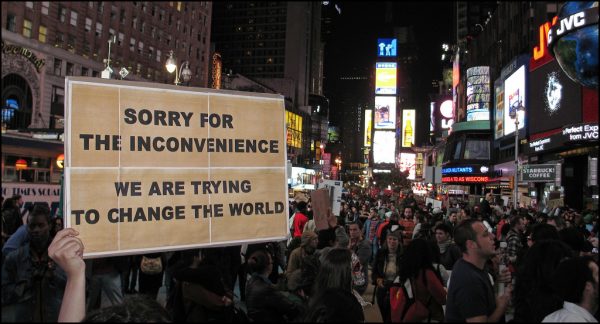
Reflecting on work and freedom
In the years since the financial crisis the way we think about work has undergone a major transformation, and the concept of work itself has been invested with an abundance of often contradictory meanings. Southern Europe has suffered as its citizens saw the prospect of finding employment become increasingly rare, with social discontent concentrating on the lack of job opportunities and many young and less young people moving to more prosperous European nations in search of work. Countries less hardly hit by the crisis have also faced an increased precariousness of the job market, the curtailing of workers’ rights and the deterioration of work conditions, epitomised by dropping salaries, increasing working hours and the spread of zero-hour contracts across industries. Seemingly oblivious to the difficulty of many to find work in the first place, those at the higher end of the pay spectrum seem to have become all the more concerned about work-life balance, encouraged by an abundance of articles and publications that promise to help them achieve the latter, whilst also urging them to take charge of their careers and develop them accordingly to their individual goals and talents.

Our social positioning and the kind of employment opportunities available to us significantly shape our attitudes towards work. What we seem to have in common, however, is a tendency to think about work as something that enables us to provide for ourselves and our families, as a means to achieve our potential, and, in some cases, as both. The relationship between work and freedom has seemed so far to revolve mainly around the extent to which our jobs enable freedom from necessity, or freedom to pursue our own passions, but in recent years these beliefs seem to have shifted, the most important contributing factor being that work is not anymore a guarantee of our ability to build our future or achieve our goals.
Some have suggested that this particular historical conjuncture can be regarded as an opportunity to reinvent ourselves and the way we live and work, for example by privileging voluntary activities that earn us no income but reward us with pleasure, shifting the focus away from individualistic models of life in order to imagine new social arrangements based on solidarity (think social movements such as Occupy). The idea that work needs to be rethought has not been sole prerogative of grassroots activists: over the past years the European Commission has also focused on ways to improve working conditions: in 2014 Belgian labour ministers suggested that the crisis could be an opportunity to rethink what people want, emphasising that not only salaries, but also social contacts, trainings and pleasure are to be factored.

Corporations have been attempting this for some time now, putting themselves at the forefront of a rethinking of work patterns that promotes flexibility, location-independent positions, and a less hierarchical managerial ethos. At the same time, more and more people are pursuing more or less creative free-lance career paths that enable them to earn a living whilst maintaining relative independence from location and strict working hours. The benefits of these new work arrangements of course often come at the expense of employee’s rights, pensions and contributions, and carry the risk of living time ending up being encapsulated by working time.
The common experience of our times, at least on this side of the globe, seems to be that many of us have either been forced out or have chosen to move away from traditional work patterns, giving up the idea of a by now seemingly impossible-to-achieve security, and looking elsewhere for fulfilment and purpose. Our understandings of the relationship between freedom and work seem to have veered towards a more or less attainable fantasy of freedom from work, or at least to one of freedom from traditional jobs and work-life arrangements.
But what is it exactly, beyond job insecurity and less than ideal work conditions, that motivates people to move away from once desirable career paths? To answer this question I have talked to two women who have recently decided to quit or change the focus of their careers. Both of them have worked in the same field for nearly ten years, Giselle as a young people worker and more recently supporting young women at risk of sexual violence, and Gabriela in academia. Both of them came to their fields moved by passion, Giselle wanting to be a figure of support and motivation for young people, and Gabriela following her fascination for the Medieval period, something that felt alien to her having grown up in Brazil. Both of them love their chosen careers, but have also mentioned the difficulty encountered when their jobs became their ‘identity’, as Giselle put it, or, in Gabriela’s words, their ‘whole social persona’. From being a source of inspiration and fulfilment, work seemed to become a limitation when their lives started revolving around this and other things they enjoyed started suffering – being it because of the strain of working with trauma on a daily basis or as a result of the specific set of standards imposed by academic work.

The choice to shift focus from their long-term careers seems to have spurred from a need to re-discover pleasure and make space for other pursuits and passions. While Giselle decided to take some time off to focus on self-care and travel, in other words reclaiming the time and space that are increasingly put under strain by contemporary work arrangements, Gabriela chose to take a different direction in her academic career, but her main focus will be that of making space for her life-time passion: writing. Both women disclosed coming to a point where the restraints imposed by their jobs on their lives brought them to experience anxiety and frustration or even resentment and regret, and expressed that it is important to them to feel they are doing something not only for the sake of money or social constrictions, but because it feels like the best way to achieve happiness, purpose and satisfaction.
Interestingly, their answers as to what constitutes freedom and its relationship to work seem to bring us back to one of the initial points: work is a means to an end, economic resources are necessary to enable choice and work is understood in that sense as freeing or at least empowering. Freedom, however, is for them more linked to the achievement of their own potential through the pursuit of desires, goals and aspirations – being it a reordering of priorities to suit one’s passions or simply that of regaining the ability to enjoy daily life.
achievements, career, desires, featured, flexibility, freedom, freelance, Giovani1, golas, happiness, self-focus, work, work-life balance
Gato d' Alice » Arquivos » Trabalho ou liberdade?
[…] Uma amiga fantástica e escritora, Sara Gvero, publicou uma cogitação reflexiva (!) sobre pessoas que estão passando pelo complicado e exaustivo processo de troca de carreira e resolveu falar um pouco sobre mim. Parece auto-propaganda, mas não é! Vale a leitura. Sara escreve para vários canais, e sempre sobre temas de alguma forma relacionados a mulheres, entre eles a revista italiana Pequod Rivista. Leia o texto de Sara aqui http://pequodrivista.com/reflecting-on-work-and-freedom/ […]